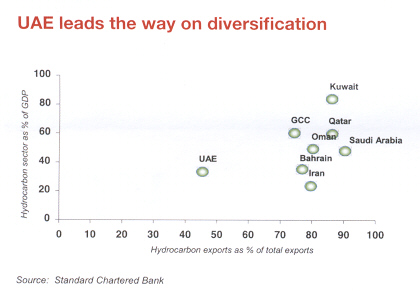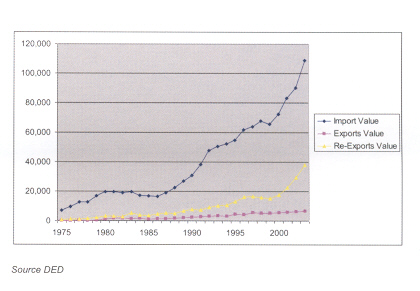|
Dubai
is a hot desert country with a small population and
until oil was discovered it had few natural resources
other than its Creek and smart people with a talent for
and history of trading.
And even after
the discovery of oil, it turns out to have less than
some of its neighbours. And yet Dubai flourishes. It
flourishes not just locally but also as a major player
in the world market. It has become a hub for re-exports
in the Middle East and Indian Sub-continent. It has two
of the world’s largest ports – the Port Rashid and Jebel
Ali and has become the world’s third largest operator of
ports with its acquisition of P&O. Dubai has a dynamic
stock market and a booming property market. EMAAR is
the world’s largest quoted property developer.
Construction projects, such as Palm Island and of course
the Burj Al Arab, have become symbolic to the rest of
the world of what is happening here. People from all
over the world are flocking to live and work here
bringing with them an impressive diversity skills and
business experience to add to the cultural mix.
Standards of living are among the best in the world for
perhaps the greatest proportion of the population at
large – and improving all the time. Global companies
are rushing to open offices here as a focal point for
business in this part of the world.
And so it goes
on. By any measure of economic development we just get
better and better, beating our compatriots in the UAE
and surpassing all other countries nearby for growth and
diversity.

We no longer rely
wholly on oil as the source of our wealth per se but
more as the most valuable tool we have to help our
overall development. And all this is happening in a
region, as a whole, of considerable political and
economic turmoil.
And whilst some
fear we may be in an economic bubble, most believe that
we are in a position of real and continuing growth with
underlying strength and long-term stability. True,
some of the excesses of the stock and property markets
cannot continue but the development of a national
infrastructure that includes roads, utilities, telecoms,
homes, tourist facilities, medical support, financial
institutions, and both national and foreign businesses,
is a good place to start. Not to mention sufficient
potable water for over 1 million people in a country
with no more than a handful of rainy days a year.
So what is it
that has created the environment for this remarkable
development in Dubai?
Today we are
often compared with Singapore and Hong Kong. But Hong
Kong came to prominence over a period of 100 years and
Singapore has taken over 50 years to achieve its present
position. Dubai has truly developed in little over 10
years and it hasn’t stopped yet.
Oil helps – revenues
from oil still represent about 7% of GDP.
Geographically we are in a perfect position to grow an
economy with a strong emphasis on re-export goods and
services and especially so in the Middle East and Indian
Sub-continent. Look at the record of over the years:

Exports are flat
but the re-export curve is steep, as is the import
curve. Imports remain high for two reasons. We are
developing an infrastructure and we have rising consumer
demands as a result of growing and increasingly
widespread wealth. Consider how the import value of
consumer durables has risen from 30Bn/Dhs in 2000 to
over 70Bn/Dhs in 2004 with a near 40% year on year
growth in the last year of the period.
But our
uniqueness stems in particular from the guidance and
vision of our ruler, H.H. Sheikh Mohammed bin Rashid Al
Maktoum, a business visionary of enormous drive and
energy, who manages the nation more as if it were a
Dubai based multi national corporation than a country.
This is truly unprecedented.
The Government’s
hand rests everywhere on the business of the country,
but generally it rests lightly. Rather like the board
of a large company it interests itself in the big
picture of what is happening, sometimes taking direct
control initially but then letting go as the staff gain
expertise and confidence. An example presents itself in
the area of healthcare. In 1995 Dubai had 5 government
controlled hospitals. It still does but by 2003 there
were also 9 privately run ones. The total number of
government-employed doctors has risen 23% in the same
timeframe but the number of private doctors has risen
144%. The number of government health clinics has risen
6% but the number of private ones by 77%.
We have freedom
of movement of capital and of goods and services. The
whole environment is geared to developing business
allowing capital to move in and out of the country
quickly, to acquire, sell and resell goods and services
anywhere in the world and quick easy redeployment when
needed with minimal bureaucracy and considerable help
from the authorities. The establishment of the free
zones has added to the unique flavour of doing business
here and a fledgling but lively stock market helps keeps
investors coming into the country. Investment floods in
from Saudi or Europe and locally as it has done, for
example, in the last year for property following
proposed creation of freehold laws. There is a lot of
volatility in our stock market and not many stocks but
money flows freely and often, meaning that as commercial
opportunities arise there is always investment available
to boost the economy as a whole. Day traders are having
a field day but it keeps money flowing in the market as
well as boosting consumer spending.
Government
regulation is fairly light and may have to tighten – not
to stifle growth but to prevent for example, false
markets caused by insider trading.
And we have a
tax-free environment. This stimulates growth of
businesses - large and small. The government’s Intilaq
scheme helps the smallest of business get started whilst
the profits from the stock market keep investment
flowing. Profits remain with the company allowing for
re-investment in growth or new enterprises.
Most unusually of
all we have the free movement of labour. Foreign
workers flock here ensuring both labour per se and the
highest levels of skill are attracted. And here again we
have the light hand of government operating simplified
immigration processes & working at speeds unthinkable in
Europe or USA. Businesses are able to find skilled
workers quickly and bring them in easily. Labour is
attracted to the region because it can earn well and
perhaps just as importantly with the free movement of
money it can repatriate significant amounts of cash.
Dubai remains
something of a self-perpetuating enigma. Until the sad
demise of Sheikh Maktoum bin Rashid Al Maktoum we had a
Company Chairman ably assisted by a CEO – Shaikh
Mohammad Bin Rashid Al Maktoum, Vice- President and
Prime Minister of the UAE and Ruler of Dubai – men who
would have risen to prominence in any boardroom in the
world. Now we have a new Board with stability provided
by the new Chairman. If they continue in the current
policies, Dubai should be able to keep paying its
shareholders – all of us living and working here, UAE
Nationals and Immigrants alike – handsome dividends. | 